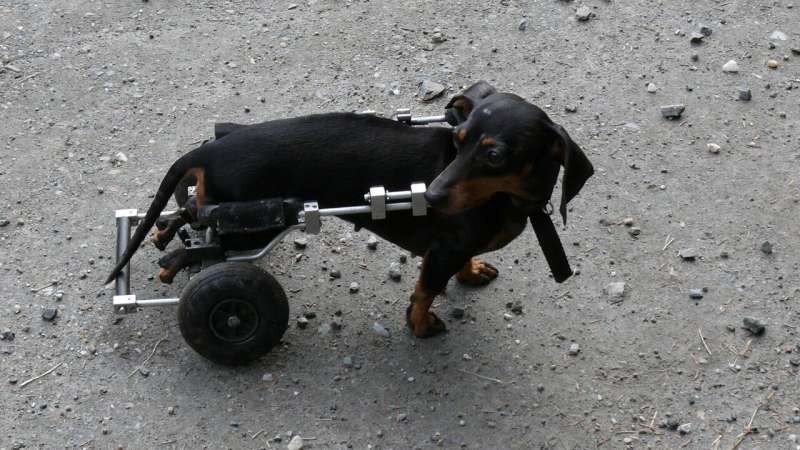This article has been reviewed according to Science X's editorial process and policies. Editors have highlighted the following attributes while ensuring the content's credibility:
fact-checked
trusted source
proofread
Caring for dogs with special needs

Special-needs dogs exist on a spectrum that may include those with physical impairments—such as missing, deformed, or paralyzed limbs; blindness; or deafness—with behavioral issues such as separation anxiety or situational fears, or with medical diagnoses like chronic illnesses, diabetes, or allergies.
While incredibly rewarding companions, dogs with special needs require a level of commitment and understanding that differs from caring for other pets.
Before welcoming a special-needs dog into a home, Dr. Rachel Melvin, a surgery intern at the Texas A&M School of Veterinary Medicine and Biomedical Sciences, offers insights that prospective owners should know before fostering or adopting so they are well-informed and prepared for the responsibilities ahead.
The first questions
There are several important questions owners should ask themselves to ensure they are able to provide a happy and safe home environment for a new, special-needs family member.
"Dogs with special needs are a lot of work, and people really need to know what they're signing up for," Melvin said. "One thing you should be sure of is that your current lifestyle fits with that specific dog's needs, because you're more likely to succeed if what you already do every day works for them versus having to change your entire life.
"For example, if you work long hours away from home, it will be more challenging to care for a dog that needs frequent potty breaks," she shared. "Also, if your home is known to have toys out in different places each day, then a dog that is blind or uses a wheelchair will have trouble navigating the daily changes in their path. Personally, I don't have a good setup for giving dogs baths, so it would be hard for me to care for a dog that requires additional skin care."
In addition to ensuring your lifestyle meets the physical space demands of a pet's needs, Melvin said it's also important to address questions about the dog's medical requirements, including ongoing treatments, medications, and veterinary care.
"If someone is going to care for a special-needs dog, they should ask whether the condition can be comfortably managed by their general practitioner or if a specialist or behaviorist will be required," Melvin explained. "Additionally, how often are medical care and rechecks needed? It's really important that owners understand the frequency of getting checkups to manage the condition and make sure nothing progresses."
Financial implications of caring for a special-needs dog also should be considered, as medical requirements can be costly. This can help owners ensure they are prepared to provide the necessary care without placing undue strain on their finances.
"Potential owners need to have an idea of what the long-term cost could be, particularly if the animal's condition were to worsen in the future," Melvin said. "Asking relevant questions can be useful, such as how likely it is that the condition will progress, what it could look like if it does, and what owners will need to do to support the animal."
Extra care requirements
The goal of any responsible pet owner is to create the best possible environment for their animal to thrive and succeed. For those considering caring for a special-needs dog, this can include providing necessary equipment or changes to the home that improve the pet's quality of life.
"Owners might need to consider if the animal will require special food, elevated bowls for food and water, and a designated area that is blocked off for them to eat and drink," Melvin explained. "If the animal has urinary or fecal incontinence issues, what does going potty look like? It could mean using diapers or simply cleaning up a designated area after they do their business.
"They might also benefit from ramps; wide, wheelchair compatible pathways; or soft cushioning on corners," Melvin continued. "For those who are blind, fences should be placed around stairs, especially if the dog is kept upstairs so they don't accidentally fall."
For any pet with mobility issues, Melvin suggests owners place yoga mats, carpet runners, or pieces of carpet on top of slick surfaces, allowing the dog to gain traction when getting up and moving around.
Enrichment, quality of life
Enrichment activities also are beneficial for a special-needs dog's mental and physical well-being, but owners need to prepare for the time required for day-to-day care and activities.
"I once had a foster dog that couldn't walk well, and I was able to care for him rather easily until he got bigger and wanted to move around more, which took more time and was harder for me to manage on top of our normal morning routine," Melvin said.
"Owners may need to consider if the dog needs a yard to walk around in or if leashed walks will always work," Melvin said. "Also, what kind of toys can they play with? Do they like snuggling? Do they like getting on the couch? All these things can affect how they live their life, and the goal is to make it easy for them."
Fostering or adopting a special-needs dog can be immensely fulfilling, but it comes with its own set of challenges when preparing for the long-term commitment of providing a loving and supportive home. With the right knowledge and preparation, owners can make a profound difference in the lives of these dogs, giving them the care and love they deserve.
Provided by Texas A&M University





















